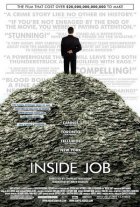
Inside Job Page #11
Inside Job transcript – Sony Pictures – September 2010
49
02:
05:28.18CHARLES FERGUSON: Forgive me, but that's clearly not true. I m-
DAVID McCORMICK:
What do you mean, it's not true?CHARLES FERGUSON: In August of 2008, were you aware of the, the credit ratings
held then by Lehman Brothers, Merrill Lynch, AIG; and did you think that they were
accurate?
02:
05:45.02FREDERIC MISHKIN: Well, uh, e-, uh, certainly by that time, it was clear that that earlier
credit ratings were inaccurate, because they had been downgraded substantially.
CHARLES FERGUSON: No they hadn't.
FREDERIC MISHKIN: Uh, there's still, there was still some downgrading, in terms of the,
the industry, concerns of the ind-, certainly the stock prices –
02:
05:58.20CHARLES FERGUSON: Not some; all those firms were rated at least A2 until a couple
of days before they, uh, were rescued.
FREDERIC MISHKIN: Well then, you know, then the answer is, I just don't, don't know
enough to t-, really answer your question on this particular issue.
02:
06:08.20NEWSCASTER:
Governor Fred Mishkin is resigning, effective August 31. He says heplans to return to his teaching post at Columbia's Graduate School of Business.
CHARLES FERGUSON: Why did you leave the Federal Reserve in August of 2008 – I
mean, in, in the middle of the worst financial crisis –
FREDERIC MISHKIN: So, so, uh, that, uh, I had to, to revise a textbook.
NEWSCASTER:
His departure leaves the Fed board with three of its seven seatsvacant; just when the economy needs it most.
02:
06:32.24CHARLES FERGUSON: Well, I'm sure your textbook is important and widely read. But
in August of 2008, you know, some, somewhat more important things were going on in
the world, don't you think?
Inside Job transcript – Sony Pictures – September 2010
50
02:
06:42.05NARRATOR:
By Friday, September 12th, Lehman Brothers had run out of cash, and theentire investment banking industry was sinking fast. The stability of the global financial
system was in jeopardy.
That weekend, Henry Paulson and Timothy Geithner, president of the New York Federal
Reserve, called an emergency meeting with the CEOs of the major banks in an effort to
rescue Lehman.
{VIKRAM PANDIT - CEO OF CITIGROUP
JOHN J. MACK - CEO OF MORGAN STANLEY
JAMIE DIMON - CEO OF JP MORGAN
LLOYD BLANKFEIN - CEO OF GOLDMAN SACHS}
02:
07:06.19 But Lehman wasn't alone. Merrill Lynch, another major investment bank,was also on the brink of failure. And that Sunday, it was acquired by Bank of America.
The only bank interested in buying Lehman was the British firm Barclay's. But British
regulators demanded a financial guarantee from the U.S. government. Paulson refused.
{NEITHER LEHMAN NOR THE FEDERAL GOVERNMENT
HAD DONE ANY PLANNING FOR BANKRUPTCY.}
02:
07:34.04HARVEY MILLER:
We all jumped into a yellow cab; and went down to the FederalReserve Bank. They wanted the bankruptcy case commenced before midnight of
September 14. We kept pressing that this would be a, uh, terrible event. And at some
point, I used the word "Armageddon." Had they fully considered the consequences of
what they were proposing? The effect on the market would be extraordinary.
02:
08:03.05CHARLES FERGUSON: You said this.
HARVEY MILLER:
Yes. They just said they had considered all of the comments that wehad made; and they were still of the belief that in order to calm the markets and move
forward, it was necessary for Lehman to go into bankruptcy.
CHARLES FERGUSON: Calm the markets.
HARVEY MILLER:
Yes.02:
08:21.08Inside Job transcript – Sony Pictures – September 2010
51
CHARLES FERGUSON: When were you first told that Lehman in fact was going to go
bankrupt?
CHRISTINE LAGARDE: Ah, after the fact.
CHARLES FERGUSON: After the fact.
CHRISTINE LAGARDE: Um-hm.
CHARLES FERGUSON: Wow. Okay. Um – and – what was your reaction when you
learned of it?
CHRISTINE LAGARDE: Holy cow.
02:
08:42.04NARRATOR:
Paulson and Bernanke had not consulted with other governments, anddidn't understand the consequences of foreign bankruptcy laws.
{SEPTEMBER 16, 2008}
REPORTER:
– bankers at Lehman Brothers London continued to empty their deskstoday.
NARRATOR:
Under British law, Lehman's London office had to be closed immediately.HARVEY MILLER:
All transactions came to a halt. And [there are] thousands andthousands and thousands of transactions.
GILLIAN TETT:
The hedge funds who had had assets with Lehman in Londondiscovered overnight, to their complete horror, that they couldn't get those assets back.
02:
09:10.00SATYAJIT DAS:
One of the points of the hub failed. And that had huge knock-oneffects around the system.
NEWSWOMAN:
The oldest money market fund in the nation wrote off roughly threequarters of a billion dollars in bad debt issued by the now-bankrupt Lehman Brothers.
02:
09:24.23NARRATOR:
Lehman's failure also caused a collapse in the commercial paper market,which many companies depend on to pay for operating expenses, such as payroll.
NEWSWOMAN:
That means maybe they have to lay off employees; they can't buyparts. It stops business in its tracks.
Inside Job transcript – Sony Pictures – September 2010
52
GILLIAN TETT:
Suddenly, people stood, and said: Listen; what can we believe in?There's nothing we can trust anymore.
02:
09:43.25NARRATOR:
That same week, AIG owed 13 billion dollars to holders of credit defaultswaps; and it didn't have the money.
ANDREW SHENG:
AIG was another hub. If AIG had stopped, you know, all planes mayhave to be, you know, stop flying.
NARRATOR:
On September 17th, AIG is taken over by the government. And one daylater, Paulson and Bernanke ask Congress for 700 billion dollars to bail out the banks.
HENRY PAULSON:
We are coming together –NARRATOR:
They warn that the alternative would be a catastrophic financial collapse.02:
10:13.13NOURIEL ROUBINI:
It was scary. You know, the entire system froze up; every part ofthe financial system, every part of the credit system. Nobody could borrow money. It
was like a cardiac arrest of the global financial system.
{SEPTEMBER 15, 2008}
HENRY PAULSON:
I am playing the hand that was dealt me. Uh, a lot of what I amdealing with, eh, you know, I'm dealing with the consequences of things that were done,
often, many years ago.
02:
10:35.07DAVID McCORMICK:
Secretary Paulson spoke throughout the fall. And all the potentialroot causes of this — and there are plenty — he called 'em. Uh, so I, I'm not sure –
CHARLES FERGUSON: You're not being serious about that, are you?
DAVID McCORMICK:
I am being serious. What, what would you have expected? Uh, I,I'm, what are, what were you looking for that you didn't see?
Translation
Translate and read this script in other languages:
Select another language:
- - Select -
- 简体中文 (Chinese - Simplified)
- 繁體中文 (Chinese - Traditional)
- Español (Spanish)
- Esperanto (Esperanto)
- 日本語 (Japanese)
- Português (Portuguese)
- Deutsch (German)
- العربية (Arabic)
- Français (French)
- Русский (Russian)
- ಕನ್ನಡ (Kannada)
- 한국어 (Korean)
- עברית (Hebrew)
- Gaeilge (Irish)
- Українська (Ukrainian)
- اردو (Urdu)
- Magyar (Hungarian)
- मानक हिन्दी (Hindi)
- Indonesia (Indonesian)
- Italiano (Italian)
- தமிழ் (Tamil)
- Türkçe (Turkish)
- తెలుగు (Telugu)
- ภาษาไทย (Thai)
- Tiếng Việt (Vietnamese)
- Čeština (Czech)
- Polski (Polish)
- Bahasa Indonesia (Indonesian)
- Românește (Romanian)
- Nederlands (Dutch)
- Ελληνικά (Greek)
- Latinum (Latin)
- Svenska (Swedish)
- Dansk (Danish)
- Suomi (Finnish)
- فارسی (Persian)
- ייִדיש (Yiddish)
- հայերեն (Armenian)
- Norsk (Norwegian)
- English (English)
Citation
Use the citation below to add this screenplay to your bibliography:
Style:MLAChicagoAPA
"Inside Job" Scripts.com. STANDS4 LLC, 2025. Web. 24 Feb. 2025. <https://www.scripts.com/script/inside_job_42>.







Discuss this script with the community:
Report Comment
We're doing our best to make sure our content is useful, accurate and safe.
If by any chance you spot an inappropriate comment while navigating through our website please use this form to let us know, and we'll take care of it shortly.
Attachment
You need to be logged in to favorite.
Log In